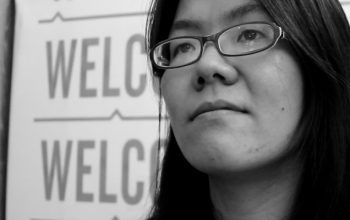Lennard Hulsbois is working for Aquarius, which is a “digital partner” realizing visions and solutions in the digital world. EARS asked Lennard to share his insight on audience engagement online.
Hey, who are you and what do you do?
My name is Lennard Hulsbos. I work for a company called Aquarius. Essentially what we do is everything in the digital sphere, from online or mobile games to social media strategies and content creation. I’m what they call a strategist. Meaning that I do a lot of research and I come up with conceptual framework for our work.
Our world is full of information and opinions, but the core is who do you want to be as a brand and how you can express that.
You’re here in EARS on Shanghai to talk about the physical world and the digital world and how they come together. What is your topic about?
If you look at the conversion of the physical world into the digital world, what you see today is that we all are using mobile devices that are connected to the internet, the internet of things. Today’s world requires both consumers and brands to constantly be there. If you turn off your phone, all of a sudden you get angry text messages and phone calls from other people asking “where the f* were you?” when you turn your phone on again. Well, I was here but I just wasn’t connected. And for brands, it’s even more a topic I would argue. When companies, brands or festivals are thinking about how to engage with their target audience, I believe that the most important thing is relevance. We have a world that is extremely cluttered in terms of information that is available, the opinions that are available, but what matters is to decide what do you want to be as a brand and how you can express that. And this is what I talked about here in EARS on Shanghai.
Communication is no longer from one to many, it’s from everyone to everyone – constantly.
How do you see the development until now and from now on?
We are pushed into a very personal communication space. Communication is no longer from one to many or many to one. It’s everyone to everyone – constantly. This means that as a brand you can no longer deal with generalisms. You have to have a specific point of view and engage with larger topics from society. The topics could be environment, elderly care, family, as it was in it’s old fashioned concept which is no longer happening that much. And let this be in the West or in Asia, it doesn’t really matter. Understanding your consumer, what they want and what they are looking for, is fundamental. This will change everything.
What I have seen around me is that we are no longer organized around centralized ideas. We will have our ideas and these ideas will travel. You and I might not agree on this same topic but someone here in China might and we could connect, despite that you and I are a lot closer to each other geographically, historically and culturally. This is a very interesting thing because when the nations are forced to change, the education, to a certain point, has to change as well.
Coming to China with answers is arrogant.
Are there differences between the Western and Asian consumers?
I find it difficult to give a general answer to be honest. If we are talking about a “Chinese consumer” if such an archetype exists, the main difference is the usage of mobile technology. The integration of mobile lifestyle is a lot deeper here. It has way bigger extendece compared to the West for brands and companies. If you look at WeChat for instance, it’s a very interesting technology. It uses elements from other services but mixes them in quite an unique way. And what’s going to happen with these kinds of things is natural evolution: people are going to get tired and they will jump on one thing and not jump on another. Xiaomi, which is currently the challenger in the mobile phone industry in China, sold 150 000 telephones in ten minutes. It’s crazy! We don’t know this kind of stuff back home in Europe and this makes it very interesting.
A lot of people come here thinking like this is a communist country. I would argue, China is one of the most free country I’ve ever been. And this is compeletely related to me being from Holland. But the point is that as an individual, I get to move around here. I get to say what ever I want, which is something that less and less, at least in my personal point of view, appreciate in the Netherlands. There I’m told: why do you always make things so difficult, why do you think about these things? Well because they are important, privacy issues are important! In China, you find yourself in the middle of a very different debate. The fact of the matter is that there are a lot of different elements in this dynamic that you have to try to understand and try to be open about. Coming here with answers is arrogant. Coming with questions is healthy for everyone. Where ever you are going in this world, going with question is always better than with answers.






